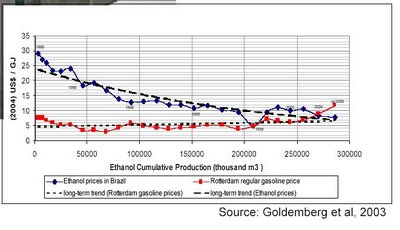Technological Learning Curves: Renewable Energy Redux.

Renewable Energy Redux. Data showing learning curve demonstrating reduction in cost for Brazilian ethanol (blue) undercuts price of petroleum based liquid fuel (red) by 2005. From a talk by S. Coelho April 2006.
Welcome back to students of the Microbe. This semester, The Pundit is going to concentrate on Microbial Biotechnology.
He's especially emphasising technological innovation. It's this innovation that has delivered most economic growth this last century, and that's what solves problems in this world - prosperity and resources that better management other problems in societies feasible.
The message is clear: intellectual assets and imagination saves lives, rain-forest, and pristine wilderness.
To start the innovation ball rolling, The Pundit is posting some examples of how innovation over time allows biotechnology products to be made more cheaply and efficiently.
This is the slow burn of incremental improvement year after year, only a few percent per year, but eliminating much poverty over decades.
A super example is ethanol fermentation used in Brazil to make liquid fuels. That is, sugar cane based biofuel.
This started out being relatively energy, land, and cost inefficient in the early 1980s, and bioethanol fuel nearly collapsed as an industry in Brazil when oil prices fell because it was very costly. It dragged subsidies from other areas of agriculture where investment was sorely needed. Not so today.
In this case many technological innovations have allowed ethanol from sugar cane to become energy efficient (with fuel energy output being 3-4 times the fuel energy input EOIR) .
Brazilian ethanol is now cost competitive with petroleum liquid fuels without any subsidy. These innovations, including biotechnology-based method changes in fermentation and strain improvement, are ongoing, and there is ample room for further efficiency improvement and more innovation.
A detailed economic documentation of this case is given by Goldemberg et al 2004.
Biomass and Bioenergy 26 (2004) 301 – 304
Short communication
Ethanol learning curve—the Brazilian experience
Jose Goldemberg, Suani Teixeir Coelhob, Plinio Mario Nastaric, Oswaldo Lucond
Abstract
Economic competitiveness is a very frequent argument against renewable energy (RE). This paper demonstrates, through the Brazilian experience with ethanol, that economies of scale and technological advances lead to increased competitiveness of this renewable alternative, reducing the gap with conventional fossil fuels.
Labels: Biofuels, Innovation, Process Improvement

0 Comments:
Post a Comment
<< Home